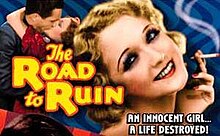The Road to Ruin (1934 film)
| The Road to Ruin | |
|---|---|
 DVD cover (detail) | |
| Directed by | Dorothy Davenport Melville Shyer |
| Written by | Dorothy Davenport Willis Kent (uncredited) |
| Produced by | Willis Kent |
| Starring | Helen Foster Nell O'Day Glen Boles |
| Cinematography | James Diamond |
| Edited by | S. Roy Luby |
| Distributed by | True-Life Photoplays First Division Pictures |
Release dates |
|
Running time | 62 minutes |
| Country | United States |
| Language | English |
Road to Ruin is a 1934 Pre-Code, exploitation film directed by Dorothy Davenport, under the name "Mrs. Wallace Reid", and Melville Shyer, and written by Davenport with the uncredited contribution of the film's producer, Willis Kent. The film, which is in the public domain, is about a young girl whose life is ruined by sex and drugs.
Cast
- Helen Foster as Ann Dixon
- Nell O'Day as Eve Monroe
- Glen Boles as Tommy
- Robert Quirk as Ed
- Paul Page as Ralph Bennett
- Richard Hemingway as Brad
- Virginia True Boardman as Martha Dixon
- Richard Tucker as Mr. Dixon
Director/writer Dorothy Davenport appears in the film in the role of "Mrs. Merrill." Mae Busch and Fern Emmett appear in uncredited roles.
Production
The Road to Ruin is a sound re-make of a 1928 silent film of the same name, written and produced by Willis Kent and also starring Helen Foster.[1] Foster, reprising her role as a high school girl, was 27 years old at the time, and six years older than her on-screen boyfriend, Glen Boles.
The titles and composers of the three songs performed in the film are not recorded.[1]
To promote the film, the producers advertised that it was not to be shown to anyone under eighteen, implying that it contained salacious material. Film censors in Virginia required a "record number" of cuts in the film before clearing it for release, according to Film Daily, while in Detroit, the film was boycotted by the Catholic Church, but was cleared by the local censors after some cuts.[1]
A novelization of the film was put out by the producers, apparently intended for use by school and civic groups as an aid to discussion of the social problems presented in the film: teenage drinking, promiscuity, pregnancy and abortion.[1]
Reception
The reviewer for Variety found the film "restrained" in comparison to the more "hotly sexed" silent version, while other reviewers found it to be an improvement over the earlier film, and "sensational".[1] A modern critic called the film "[A] sordid drive down the path of moral and physical degradation, capped off with just enough of a moral lesson to alleviate any guilt the viewer might feel for watching such a decadent display."[2]
See also
Notes
Bibliography
- Felicia Feaster and Bret Wood. Forbidden Fruit: The Golden Age of Exploitation Film. (Midnight Marquee Press, 1999). ISBN 1-887664-24-6
External links
- The Road to Ruin is available for free viewing and download at the Internet Archive
- The Road to Ruin at IMDb
- The Road to Ruin at the TCM Movie Database
- The Road to Ruin at AllMovie
